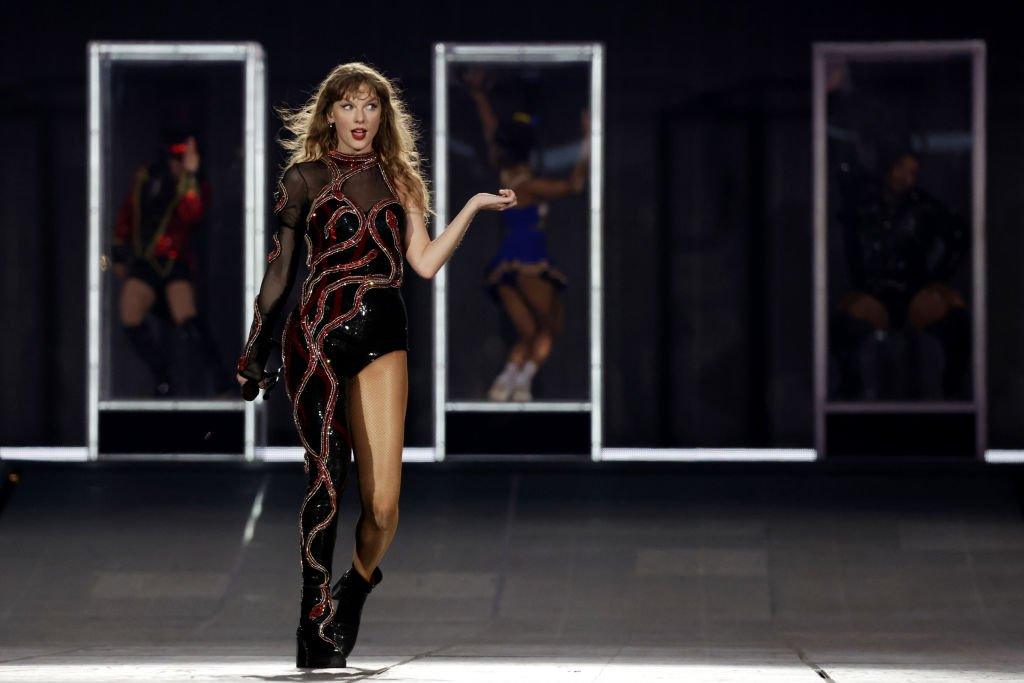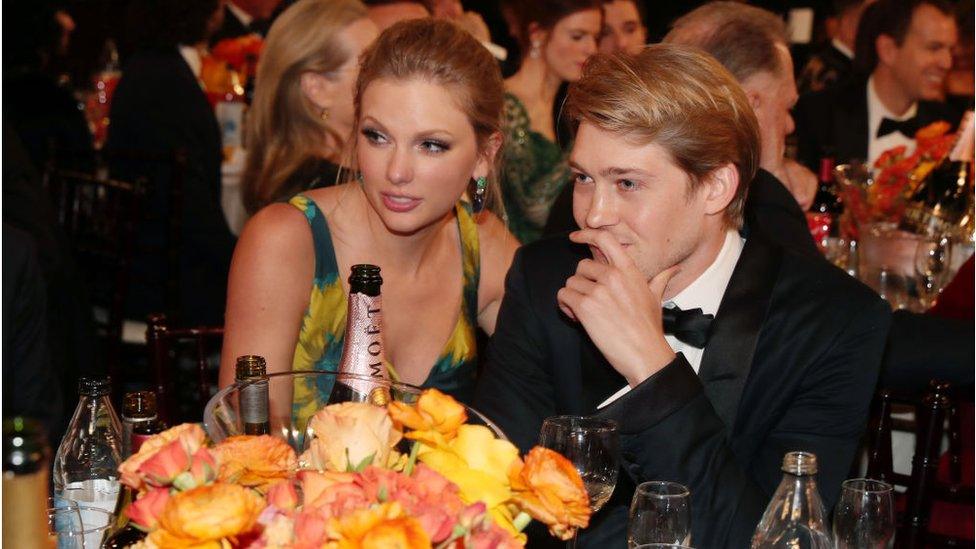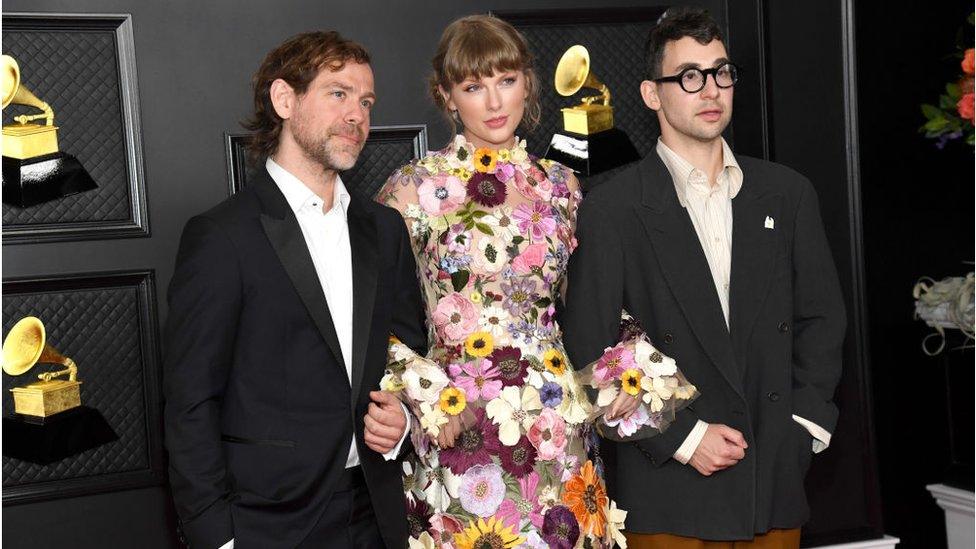Taylor Swift Tortured Poets Department review: Album finds star vulnerable but vicious
- Published

Taylor Swift has won the Grammy for Album of the Year four times - more than any other artist
That Taylor Swift would write a break-up album is no surprise.
Over her last 10 records, the star has taken a scalpel to her personal life, filleting the details of flings and trysts and heartbreaks to create some of pop's most memorable lyrics.
For the last half-decade, she's been in romantic mode. Songs like Delicate, Lover, Invisible String and Lavender Haze were all inspired by her boyfriend of six years, the British actor Joe Alwyn.
They were so close that Swift moved to London, and shared writing credits with Alwyn (under the pseudonym William Bowery) on her Grammy Award-winning albums Folklore and Midnights.
Then, in April 2023, a month after Swift kicked off her record-breaking Eras tour, it was announced that they had split.
An anonymous source told People magazine it was "amicable" and "not dramatic". But when the singer announced her 11th album, The Tortured Poets Department, at the Grammys this February, fans began to speculate it would deal with the fall-out.
They were quick to note how the title bore similarities to a group chat shared by Alwyn and his fellow actor Paul Mescal: The Tortured Man Club.
Then, Swift told the audience at a concert in Melbourne that the album was her most cathartic project yet.
"It kind of reminded me of why songwriting is something that actually gets me through my life," she said. "I've never had an album where I needed songwriting more than I needed it on Tortured Poets."
It certainly feels like a purge.

The highly anticipated album was released at 5am UK time around the world
The singer is bereft and bewildered. Vulnerable in a way we've never heard before.
She sings of being so depressed she can't get out of bed, comfort-eating children's cereal, and crying at the gym.
You can hear her heart breaking on So Long, London, as she accepts defeat and moves out.

The List: 13 Times Taylor Swift Made History
We're bringing up Taylor Swift's history: from dizzying Grammy records to reaching billionaire status and everything in between.

"Had a good run / A moment of warm sun / But I'm not the one," she laments, as layered backing vocals evoke the mournful goodbye of the city's church bells. It's up there with the best things she's ever written.
And the veil of grief remains in place, even when she's basking in the glow of her Eras tour.
"Breaking down, I hit the floor /All the pieces of me shattered as the crowd was chanting, 'More'," she sings on the deceitfully upbeat I Can Do It With A Broken Heart.

The success of the Eras tour has made Swift a billionaire
Later, she demands answers, wanting to know "if rusting my sparkling summer was the goal".
That line appears in the viciously-titled The Smallest Man Who Ever Lived, a song that opens with a weary sigh but crescendos with anger and paranoia.
"Were you writing a book? / Were you a sleeper cell spy? / In 50 years will all this be declassified / And you'll confess why you did it?"
In the sleeve notes for the album, Swift acknowledges both the turmoil of the relationship and the sharpness of her pen.
"It was a mutual manic phase. It was self harm. It was house and then cardiac arrest," she writes, before adding: "A smirk creeps onto this poet's face. Because it's the worst men that I write best."

Swift and Alwyn at the 2020 Golden Globe Awards
So, yes, this is a break-up album. But Taylor Swift didn't get to be Taylor Swift by adhering to the rules.
Throughout her career, she's swerved expectations, transitioning from teen-queen country star to pop phenomenon and, during the pandemic, a folksy author of intricate character studies.
On The Tortured Poets Department, she blurs the lines between her personas - writing both as diarist and fantasist, sometimes within the same song.
That approach peaks on But Daddy I Love Him, a stand-out, shimmering ballad about a small-town girl who runs off with the local bad boy, to the horror of her family, and "all the wine moms".
But the lyrics also address the finger-wagging discourse that surrounded Swift's reported-but-never-confirmed romance with The 1975's lead singer Matty Healy, last year.
Some fans felt let down by the relationship, saying that Healy - who has faced accusations of misogyny and racism in his career (all of which he denies) - was an inappropriate choice of partner.
In her song, Swift hits back, declaring: "I'd rather burn my whole life down than listen to one more second of all this bitching and moaning / I'll tell you something about my good name, it's mine alone to disgrace."

The album was made in collaboration with Aaron Dessner (left, from The National) and Jack Antonoff (right, frontman of Bleachers)
Barbed lyrics like those prevent the album from becoming dreary with sadness; but the production (supplied by Swift's long-term collaborators Jack Antonoff and Aaron Dessner) can smother her more vengeful instincts.
The music is full of the pillowy synths and muted drums that served the hypnagogic vibes of her last album, Midnights, so well. That's fine when she submits to melancholy on the delicately percolating Down Bad, but when she writes something salty and mischievous like Who's Afraid Of Little Old Me? it gets suffocated by layers of echo and gauzy strings.
Some of her vocals mannerisms have become overly familiar, too - like the staccato pitter-patter of her verses, and the hooks she SHOUTS FOR EMPHASIS.
But a few tracks point towards new musical directions.
The Florence + The Machine duet, Florida!!! earns its multiple exclamation points with a cacophony of drums and guitars that soundtrack a story of fleeing to the Everglades to escape the law.
And the sparse tremolo guitars of I Can Fix Him (No Really I Can) lay the perfect groundwork for Swift's darkly self-deluded lyrics.
The Tortured Poets Department is an uneven album, and one that lacks a slam-dunk radio anthem like Anti-Hero or Shake It Off - but Swift has pop music in a stranglehold for now, so it will sell by the bucketload, even after the first 17 tracks leaked a day ahead of release.
And, because the singer loves a cliffhanger, she ends the album by hinting at her next phase.

Swift is now in a relationship with US football star Travis Kelce
Clara Bow is named after the US film star who became the first "It Girl" in the 1920s, and looks at how women are moulded and sold by the entertainment industry, with their time in the spotlight dictated by anonymous "men in suits".
The last verse, and the album's closing words, are addressed to pop music's next young ingénue.
"You look like Taylor Swift / In this light, we're loving it / You've got edge, she never did / The future's bright… Dazzling."
It's a typical piece of self-awareness, bridging the gap between her self-perception and the perception of the public.
Swift knows her current world tour is a pinnacle, a once-in-a-career moment of cultural dominance - and there are younger (but maybe not hungrier) stars nipping at her heels.
With The Tortured Poets Department, she's closing a chapter on a relationship, for sure, but maybe on a way of living and working, too.
Is this the end of her latest Era?

Apparently not.
Two hours after it dropped, Swift announced that The Tortured Poets Department was a double album - with 15 extra songs instantly available on streaming platforms.
"I'd written so much tortured poetry in the last two years and wanted to share it with you," she told fans on social media, external.
This second volume lacks the thematic cohesion of the core album. She's still picking at the scabs of past relationships on songs like How Did It End and The Manuscript, but elsewhere she allows her mind to wander.
I Hate It Here is a spiritual successor to 1989's I Know Places - where Swift escapes the apparent drudgery of fame by taking flight to fantastical places in her mind; while So High School finds her in the throes of a teenage obsession, playing spin the bottle with a man who kisses her "while your bros play Grand Theft Auto".
Sonically, the second half of the record is more sedate, recalling the luscious soundscapes of Folklore and Evermore.
There are gorgeous curlicues of guitar on the caught-you-cheating ballad Chloe Or Sam Or Sophia Or Marcus; and the sparse, finger-plucked I Look In People's Windows is the album's shortest and most captivating ballad.

The 15 bonus tracks are currently only available on streaming services
But the song that's going to catch fire on social media is called thanK you aIMee - the story of a spray-tanned school bully who galvanises Swift's entire career.
"I wrote a thousand songs that you find uncool [but] I built a legacy which you can't undo," she sings. "But when I count the scars, there's a moment of truth / That there wouldn't be this, if there hadn't been you."
In the lyrics, she says she's "changed the name" of her nemesis, but the curious capitalisation of the title may hold a clue. Is KIM a reference to a certain Kardashian, who's been a thorn in Swift's side for several years?
In truth, the extra material doesn't add much to the overall package.
Swift is prolific to a fault and, although fans will lap up all 31 songs with salivatory excitement, the rest of us could do with a carefully-edited 12-track best of.
What's clear, though, is that this is Swift's final statement on her tumultuous last two years.
"This period of the author's life is now over, the chapter closed & boarded up," she wrote on social media after release, external. "There is nothing to avenge, no scores to settle once wounds have healed.
"Once we have spoken our saddest story, we can be free of it."
Related topics
- Published19 April 2024
- Published18 April 2024

- Published20 October 2022

- Published27 October 2023

- Published17 April 2024

- Published11 April 2024

- Published5 February 2024
